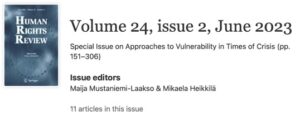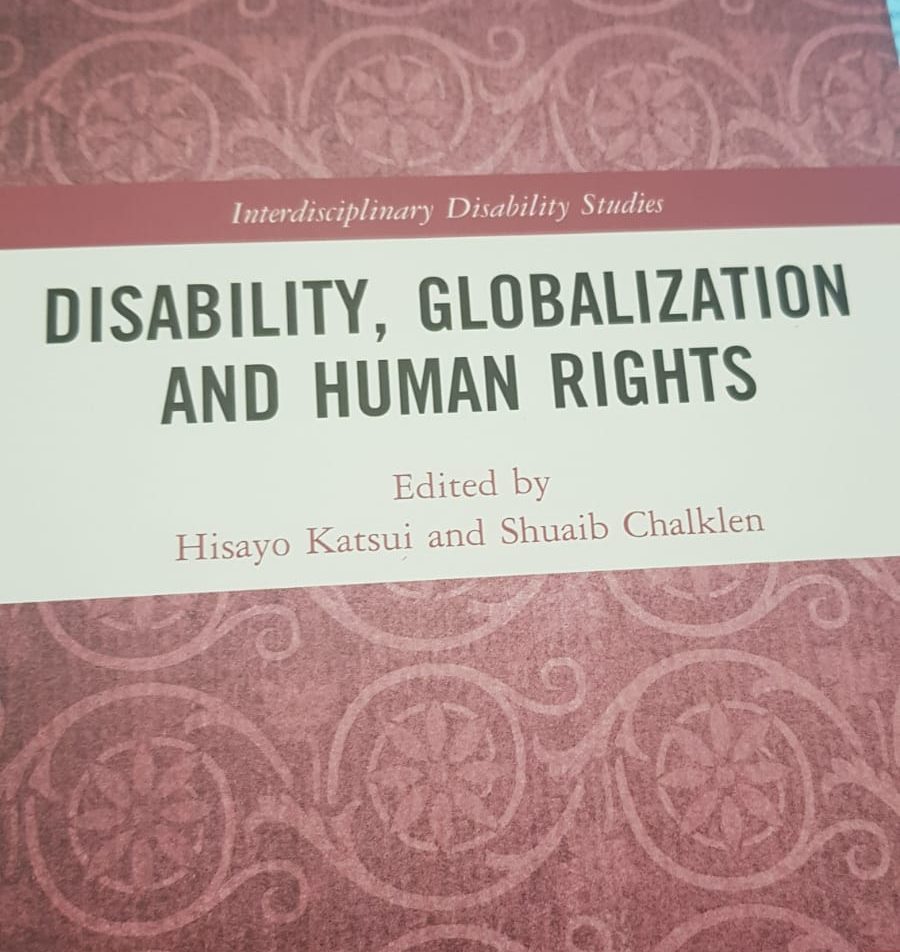
Special issue on vulnerability in times of crisis in Human Rights Review, guest edited by Maija Mustaniemi-Laakso and Mikaela Heikkilä. All articles are open access!

Special issue on vulnerability in times of crisis in Human Rights Review, guest edited by Maija Mustaniemi-Laakso and Mikaela Heikkilä. All articles are open access!
25 April 2023
The Director of the Poznan Human Rights Centre, Dr. Katarzyna Sękowska-Kozłowska, will give a presentation on ‘The reception of the Istanbul Convention in Poland’ at the Åbo Akademi University Institute for Human Rights, Turku/Åbo, Finland. The guest lecture is co-organized with the Minority research profile at Åbo Akademi University.
 A new article by the project is out on the process of ‘vulnerabilisation’ of international protection. The article reviews this process and explores some of its consequences. Vulnerabilisation, the article claims, is a necessary and important element of ensuring protection of those most in need. However, the development also comes with possible downsides, such as selectivity, compartmentalisation and potential instrumentalisation of protection, which can turn into exclusion and politicisation. As such, vulnerabilisation walks a tightrope between mainstreaming and overreach.
A new article by the project is out on the process of ‘vulnerabilisation’ of international protection. The article reviews this process and explores some of its consequences. Vulnerabilisation, the article claims, is a necessary and important element of ensuring protection of those most in need. However, the development also comes with possible downsides, such as selectivity, compartmentalisation and potential instrumentalisation of protection, which can turn into exclusion and politicisation. As such, vulnerabilisation walks a tightrope between mainstreaming and overreach.
Viljam Engström, Mikaela Heikkilä and Maija Mustaniemi-Laakso, Vulnerabilisation: Between mainstreaming and human rights overreach, Apr 2022, Netherlands Quarterly of Human Rights.

The ROVU researchers have submitted comments to a draft report by the Ministry of Justice on forced marriage in Finnish criminal law. The comments (in Finnish) are available here.
 In her recent article, professor Elina Pirjatanniemi explores the effects of fundamental and human rights on Finnish criminal law. The requirements for restrictions and extensions that such rights put on criminal law have led to concerns about the inflation of criminal law, particularly with regard to sexual offences. Pirjatanniemi examines the Finnish criminalisation discussions around rape and the purchase of sexual services between 1997 and 2020, concluding that the Finnish criminal law has shown resistance against criminalisation pressures and that the national review margin has been used to the greatest extent possible. However, she argues, rights thinking has contributed to a more analytical and contextual discussion within the criminalisation debates, with more focus being put on the victim’s rights and contributing to the reform of legislation regarding sexual offences.
In her recent article, professor Elina Pirjatanniemi explores the effects of fundamental and human rights on Finnish criminal law. The requirements for restrictions and extensions that such rights put on criminal law have led to concerns about the inflation of criminal law, particularly with regard to sexual offences. Pirjatanniemi examines the Finnish criminalisation discussions around rape and the purchase of sexual services between 1997 and 2020, concluding that the Finnish criminal law has shown resistance against criminalisation pressures and that the national review margin has been used to the greatest extent possible. However, she argues, rights thinking has contributed to a more analytical and contextual discussion within the criminalisation debates, with more focus being put on the victim’s rights and contributing to the reform of legislation regarding sexual offences.
Elina Pirjatanniemi, ‘Om sex, samtycke och mänskliga rättigheter’, JFT 4-5 (2021) 308-332.
 For discussions on the use of vulnerability reasoning in the African and European human rights systems, see the new article by Mikaela Heikkilä and Maija Mustaniemi-Laakso in African Human Rights Law Journal. Full text is available here.
For discussions on the use of vulnerability reasoning in the African and European human rights systems, see the new article by Mikaela Heikkilä and Maija Mustaniemi-Laakso in African Human Rights Law Journal. Full text is available here.
 Article by Mikaela Heikkilä, Hisayo Katsui and Maija Mustaniemi-Laakso on a human rights reading of disability and vulnerability just out in the book by Hisayo Katsui and Chalklen Shuaib (eds.) Disability, Globalization and Human Rights (Routledge 2020).
Article by Mikaela Heikkilä, Hisayo Katsui and Maija Mustaniemi-Laakso on a human rights reading of disability and vulnerability just out in the book by Hisayo Katsui and Chalklen Shuaib (eds.) Disability, Globalization and Human Rights (Routledge 2020).
Saarikkomäki Elsa, Oljakka Nea, Vanto Johanna, Pirjatanniemi Elina, Lavapuro Juha, Alvesalo- Kuusi Anne, ‘Kansainvälistä suojelua koskevat päätökset Maahanmuuttovirastossa 2015-2017. Pilottitutkimus 18-34-vuotiaita Irakin kansalaisia koskevista myönteisistä ja kielteisistä päätöksistä 2015-2017‘ [Decisions of the Finnish Immigration Service concerning international protection in 2015–2017. Pilot study] (2018).
For full text, see here
 11-15 June 2018 | Åbo Akademi University | Institute for Human Rights | Åbo, Finland
11-15 June 2018 | Åbo Akademi University | Institute for Human Rights | Åbo, FinlandThe position and empowerment of vulnerable individuals, as well as issues related to equality and non-discrimination are central to many branches of the law and development research field. Such research addresses, for example, questions on whether and in which ways different human rights, social services and legal remedies are made, or should be made, accessible to all on an equal basis. Issues related to accountability, rethinking of societal structures and distribution of resources often form a part of such scholarly debates.
The 2018 LDRN PhD Course invites doctoral candidates from different legal (and related) disciplines to discuss the role of law in addressing vulnerability, inequality and discrimination in the north and in the south. The course aims to provide the participants with insights on some of the methodological, ethical and theoretical considerations relevant for this research field. Based on interactive methods of teaching, the curriculum consists of lectures, a methods clinic, group work sessions and paper workshops.
The course will be taught by a group of experts, including
The course is organised jointly by the Åbo Akademi Institute for Human Rights, the Academy of Finland Project “Vulnerability as Particularity – Towards Relativizing the Universality of Human Rights?” and the Law and Development Research Network
Venue: Auditorium Aura, Arken, Tehtaankatu/Fabriksgatan 2, 20500 Turku/Åbo
Application time closed 30 March 2018.